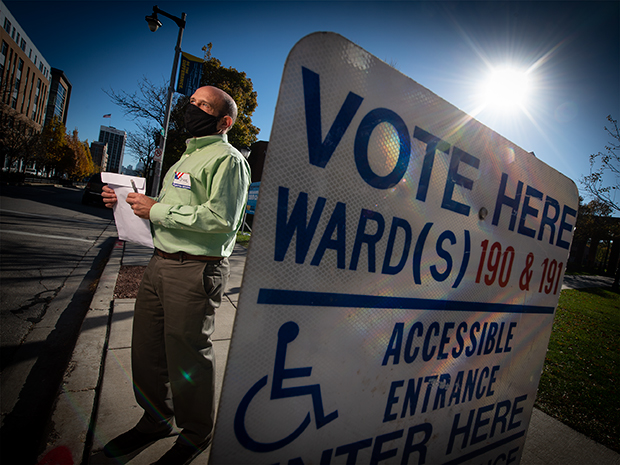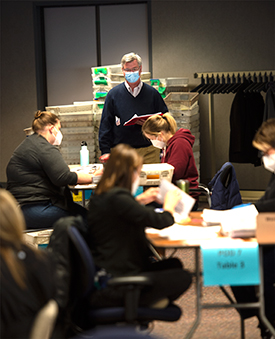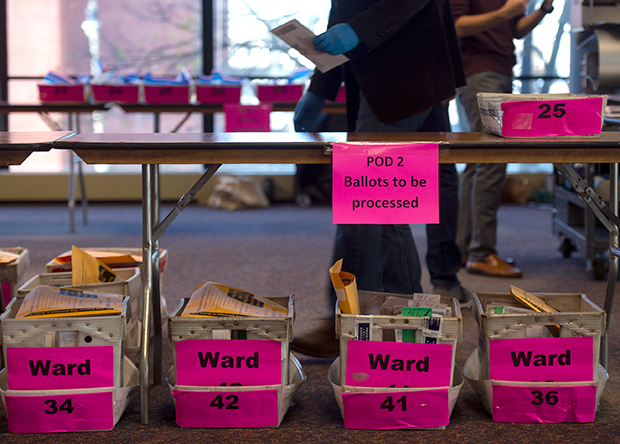Group of Foley & Lardner workers report few issues on Election Day
By: Michaela Paukner, [email protected]//December 1, 2020//
Group of Foley & Lardner workers report few issues on Election Day
By: Michaela Paukner, [email protected]//December 1, 2020//

Bruce Keyes, of counsel at Foley & Lardner, was among the lawyer volunteers manning the polls on Election Day, starting before the sun rose and wrapping up long after it went down.
“I was there from 6 a.m. to 9 a.m., so 15 hours,” Keyes said.
Keyes served as an election inspector at the Marquette University Alumni Memorial Union, the polling site for Wards 190 and 191 in Milwaukee’s District 4. He was one of nearly 20 attorneys from Foley’s Milwaukee office who was working at the polls around the city on Nov. 3.
Wisconsin broke a record for voter turnout in the 2020 presidential election. Nearly 3.2 million people cast their ballots. Early voting, both by mail and in person, led to the casting of more than 1.9 million ballots — setting another state record.
The processing of all the ballots — those cast before and on Election Day — started on Nov. 3. A number of municipalities statewide used central locations — referred to as Central Count — to tally early votes. In Milwaukee, workers at Central Count processed ballots from early morning on Nov. 3 until about 4 a.m. the next day.
At the same time, people stationed at Wisconsin’s roughly 2,400 polling sites were busy trying to make Election Day as normal as possible. Unlike in the April election, there weren’t any big delays or closings at polling sites in November. In the previous election the coronavirus pandemic had led to a shortage of poll workers, resulting in long lines at the few poll stations that were open.
Seeing those lines prompted Kelsey Boehm and Kevin Brost, associates at Foley, to spend Nov. 3 at the polls, rather than in the office.
“I wanted to make sure that we were able to have all of the precincts well-staffed so everyone can vote,” Boehm said.
Many at Foley shared the sentiment, evident in the firm’s support for those who chose to serve as poll workers. The Milwaukee office set volunteer goals, garnering so much interest that several people who wanted to help had to be put on a waitlist. Several attorneys from out-of-state Foley offices also flew in to observe democracy in action in Wisconsin.
“I wanted to be somewhere where making sure everything ran smoothly could actually matter,” said Ruben Rodrigues, senior counsel at Foley’s Boston office. “I felt like Wisconsin was a good place to do that.”
New, disenfranchised voters turn out on Election Day

An election season unlike any other left some of the Foley poll workers unsure about what to expect when they arrived for their shifts.
Keyes, who had worked at the polls for past elections, wondered how early voting would affect wait times. He and Boehm, who also served as an inspector at the Marquette Union polling site, said people moved through pretty quickly, except for some who had to stand in lines in the morning. Keyes estimated the longest line resulted in about an hour wait.
Students, as could be expected, made up the majority of voters at Marquette. Many were casting a ballot for the first time, including two students who voted curbside because they had tested positive for COVID-19. Voting curbside required poll workers to run back and forth from a downstairs polling station to the voter’s car outside — turning a five-minute process into what could be as long as 45 minutes.
“It took us a long time to get them to be able to vote properly,” Keyes said. “They were so appreciative. They both said, ‘We’re so thankful that you’re able to make it happen for us.’ That stuff is really gratifying.”
At Hayes Bilingual School on Milwaukee’s south side, Brost also helped a lot of first-time voters. He said many young Latinx voters came out with groups of friends, determined to make their voices heard.
“One group of three young men came in, and it turned out that all three of them were in the wrong place,” Brost said. “It’s impossible to know what they did when they left, but it sure seemed like they were leaving together to hit all three polling places, even though that might have been somewhat of an inconvenience.”
Keyes saw the same determination among older voters at Marquette. A handful of people who hadn’t voted in years showed up to Marquette to cast a ballot on Nov. 3, despite physical and documentational obstacles. One man even brought seven different forms of ID to ensure he could vote.
“There was a tone this year that was just different,” Keyes said. “We had several people who were clearly very determined to exercise their right to vote and put a great deal of effort into doing so.”
‘Left me feeling better about the country’
The tone leading up to Election Day was also much different than in years past. Threats of violence and accusations of fraud at the polls had voters and workers alike worried about what might happen on Nov. 3.

“I went in a little nervous after watching the news and everything leading up to the election, thinking we might have troublemakers,” Boehm said. “But while I was there, I didn’t experience any issues with observers or voters.”
Rodrigues worked as a poll observer for the Democratic Party of Wisconsin at Roosevelt Elementary School in Racine. He said Democrat and Republican observers were all kind and respectful to each other as they worked toward the same goal of ensuring democracy would be served.
“That’s what’s really happening, I think, throughout the country as these counts go on,” Rodrigues said. “You’ve got good people on both sides showing up, and it’s comforting and good to see, despite what certain headlines may say. At the end of the day, the process is working.”
Brost agreed, adding that everyone at his polling place was friendly, polite and commitment to the rules.
“It really left me feeling better about the country and the state of things than I’ve felt in some time,” Brost said. “I definitely look forward to doing it in the future whenever possible.”
Legal News
- History made in Trump New York trial opening statements
- Prosecutor won’t bring charges against Wisconsin lawmaker over fundraising scheme
- Republican Wisconsin Senate candidate says he doesn’t oppose elderly people voting
- Vice President Harris to reveal final rules mandating minimum standards for nursing home staffing
- Election workers fear threats to their safety as November nears
- Former law enforcement praise state’s response brief in Steven Avery case
- Eric Toney announces re-election bid for Fond du Lac County District Attorney
- Former Wisconsin Democratic Rep. Peter Barca announces new bid for Congress
- Republicans file lawsuit challenging Evers’s partial vetoes to literacy bill
- More human remains believed those of missing woman wash up on Milwaukee Co. beach
- Vice President Harris returning to Wisconsin for third visit this year
- Wisconsin joins Feds, dozens of states to hold airlines accountable for bad behavior
WLJ People
- Power 30 Personal Injury Attorneys – Russell Nicolet
- Power 30 Personal Injury Attorneys – Benjamin Nicolet
- Power 30 Personal Injury Attorneys – Dustin T. Woehl
- Power 30 Personal Injury Attorneys – Katherine Metzger
- Power 30 Personal Injury Attorneys – Joseph Ryan
- Power 30 Personal Injury Attorneys – James M. Ryan
- Power 30 Personal Injury Attorneys – Dana Wachs
- Power 30 Personal Injury Attorneys – Mark L. Thomsen
- Power 30 Personal Injury Attorneys – Matthew Lein
- Power 30 Personal Injury Attorneys – Jeffrey A. Pitman
- Power 30 Personal Injury Attorneys – William Pemberton
- Power 30 Personal Injury Attorneys – Howard S. Sicula











